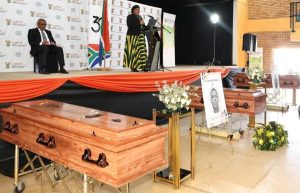Boskati, Ralane, Silinga were hanged in 1982 for attacks on police officers during apartheid era

The minister of justice and constitutional development, Mmamoloko Kubayi, paid tribute to fallen heroes Mncekeleli Boskati, Madoda Michael Ralane, and Wantu Silinga, during the handover of their exhumed remains and subsequent reburial at Mzi Sikhweyiya in Mlungisi on Saturday.
The ceremony was also attended by member of parliament, Mncedisi Nontsele, and department of transport and community safety MEC Xolile Nqatha.
Kubayi highlighted in her tribute, police brutality during the 1980s and 1990s, as documented in the Truth and Reconciliation Commission (TRC) report.
According to the report, the SAP frequently resorted to firepower as a means of asserting crowd control, and its members used assault and torture to extract information from detainees or punished them for their alleged involvement in community activism.
Kubayi noted that Boskati, Ralane, and Silinga were sentenced to death for attacking policemen and their associates in Queenstown (now Komani) during the 1980s.
Faced with police brutality and massacres in the Eastern Cape, they, like many other youths, decided to retaliate against the then illegitimate government’s violence, she said.
“Their conscience and sense of justice could not let them stand by and watch an illegitimate government continue to massacre innocent people, students, unionists, and activists,” she
said.
Boskati and Madoda, both 22 years old, were hanged at the Pretoria Central Prison on March 4 1982.
Wantu, who was awaiting execution on death row, fell ill and died on December 10 1987, at the age of 27.
They were given pauper burials in Mamelodi cemetery, and the state retained custody of their remains, denying their families the opportunity to receive or bury them with dignity.
She said receiving the news was a traumatic experience for parents and loved ones.
“Before the execution, a letter would be written to the family that their son would be executed on a set date, but the most painful part was that most of them never got to say their goodbyes.
“They would arrive only to find out that their son had already been executed.”
The minister spoke on the importance of restoring the deceased’s dignity and honouring their legacy.
“We have a duty not only to restore their dignity but to honour them,” she said. “We have not forgotten their contribution to the creation of an SA in which all of us are free.”
Kubayi stressed the bravery and sacrifice of the young activists, who fought the injustices of apartheid.
“They refused to accept an SA where black people were treated as second-class citizens.
“They chose to fight so that there could be equality and freedom for all, including those who were themselves oppressors.
“They became part of that great army of young people who responded to the call made by [then ANC] president Oliver Tambo, to render the country ungovernable,” she said.
Their bravery and courage in the face of apartheid’s brutality was said to have played a significant role in bringing about the transition to d e m o c ra cy.
“Their sacrifices will never be forgotten, we thank them and celebrate their heroism. They fought and died so that a democratic, non-sexist, and nonracial SA society can be born. They can rest in peace because the SA they fought for was born in 1994.”
The exhumation and repatriation of political prisoners’ remains are part of the Gallows Exhumation Project, initiated in 2016, to restore dignity to those executed under apartheid.
The minister also updated mourners on the ongoing efforts to exhume and repatriate the remains of former freedom fighters.
“We have a team focused on other countries, tracing liberation freedom fighters,” she said.
“We ’ve brought back remains in the past, including the former secretary general of the ANC.”
Kubayi noted that though a complex process, the second phase of repatriation was underway.
“Some families don’t want this to happen, while other countries hosting our freedom fighters consider them part of their heritage,” she said.
“These negotiations are complex, and we’re balancing different perspectives while holding continuous conversations with families and political parties.”
Within SA, the focus is on identifying freedom fighters who were killed and buried without their families’ knowledge.
“We ’re using historical records and DNA tests to identify remains and locate families. This process is intense and delicate, and we’re appealing to families to be patient.”
The minister also mentioned efforts to address cases of those who didn’t receive amnesty at the TRC, adding that they were hoping that those who were set to stand trial would help the department to find the remains that are still missing, bringing closure to families.
She said the department would also return for the unveiling of the tombstone. Nontsele recalled being actively involved with Boskati, Ralane, and Silinga in Cosas as youths in Mlungisi.
During the struggle, 14 of them were taken into custody by the police.
“Our trials were held under desperate circumstances, but we shared the same law firm to prepare for our cases,” he said.
“We managed to escape, while they were found guilty of killing a police officer.
“They lodged an appeal, lost it, and were subsequently hanged,” he said.
ABONGILE SOLUNDWANA
The post Families find closure as activists laid to rest first appeared on The Rep.
